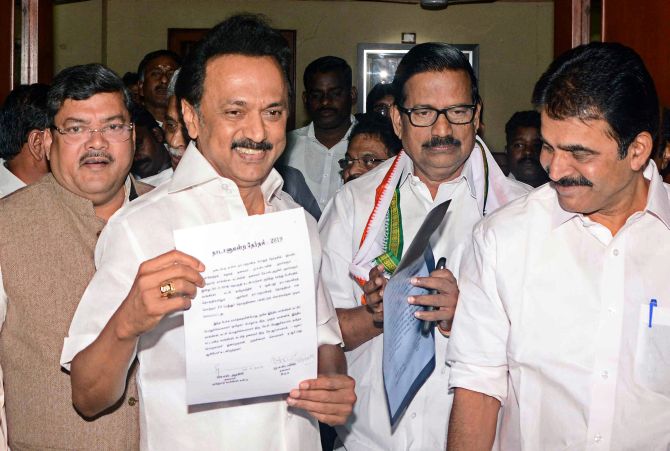
Congress and DMK seal a relationship, not merely an alliance

In an off-the-record conversation towards the end of 2018, a Tamil Nadu-based Congress leader who had just taken stock of the party’s strength in the state, had a frank admission to make about the alliance with DMK, ahead of the Lok Sabha polls: “We will seek 10 seats but they will give seven or eight. We will take what they give.”
On February 20 evening, the Congress walked away with a total of 10 tickets as part of its alliance with the DMK. This did not happen overnight and was the result of a series of trust-building measures taken by the leaderships of both parties over time.
The DMK-Congress relationship and the AIADMK-BJP alliance is a study in contrast. What began as the BJP’s attempt at being projected as an equal, if not senior partner, in the alliance ended with Union Minister Piyush Goyal’s Tuesday acceptance that his party would fight under the AIADMK umbrella.
That the DMK and the Congress would fight the 2019 general elections together was a foregone conclusion: there have been a few hiccups in their relationship even ahead of the 2016 Assembly elections.
However, the dynamics of that relationship underwent a major shift on December 16, 2018 when congress president Rahul Gandhi — whose name was not printed in the list of invitees — decided to accompany his mother Sonia Gandhi to the city where she was scheduled to unveil the statue of former DMK supremo M Karunanidhi.
Acknowledging the gesture, DMK president MK Stalin reciprocated by proposing Rahul Gandhi’s name for the pime ministership of the country. It is to be noted that DMK remains the only major political party other than the Congress to do so. As if that was not enough, Stalin went on to end every shred of speculation and called Prime Minister Narendra Modi ‘a sadist’, thrice.
Stalin’s stance has given him powerful friends in Delhi at a time when he seeks to stamp his authority on the DMK after the passing away of his father. It certainly established him as the leader of a rebel alliance in Tamil Nadu, to which every party, that has an axe to grind with the BJP and the AIADMK, gravitated.
The Congress’ success came with the early acceptance of who the boss is in Tamil Nadu. The party’s state unit president Su Thirunavukkarasar, who began his political career in the AIADMK before moving to the BJP, was gracefully shown the door after realization hit home that the DMK was not entirely comfortable with him.
The rebel alliance has had plenty of practice working together. These parties and their cadre have worked together on multiple protests and causes: often, the unifying force has been their opposition to the central and state governments. That Tamil Nadu sees among the most protests in the country helps – the state topped the nation in 2015 – and that has meant that the likes of the DMK, Congress, VCK, CPI-M, CPI, MDMK, IUML and TMMK have learnt to speak in the same voice via Jallikattu, Sterlite, Cauvery and #GoBackModi.
On the other hand is the AIADMK-BJP combine, which played coy with each other until their Tuesday marriage. At least on paper, the NDA may be a force to reckon with, but it is a machine without oil flowing through: the BJP tried to roughshod the AIADMK and failed; the PMK, through its detailed press releases, has been one of the consistent critics of the incumbent AIADMK government; the DMDK has accused the PMK of working against it while being in the NDA during the 2014 general elections.
Therein lies the rub.

